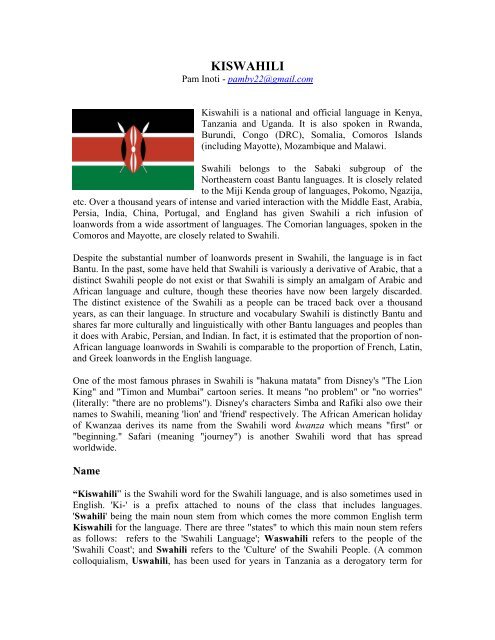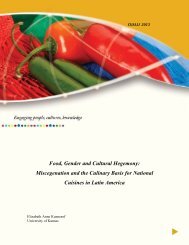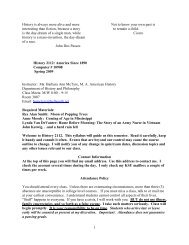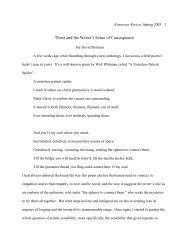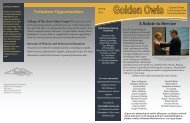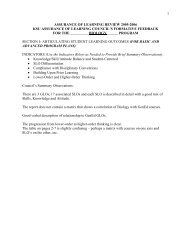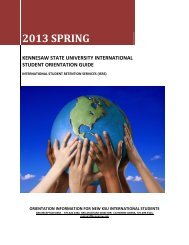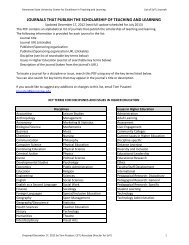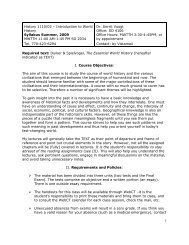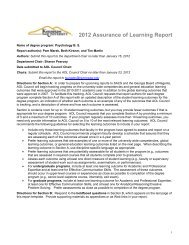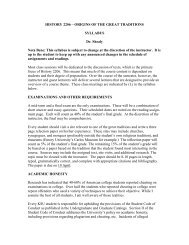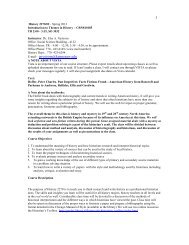KiSwahili Handout - Kennesaw State University
KiSwahili Handout - Kennesaw State University
KiSwahili Handout - Kennesaw State University
You also want an ePaper? Increase the reach of your titles
YUMPU automatically turns print PDFs into web optimized ePapers that Google loves.
KISWAHILI<br />
Pam Inoti - pamby22@gmail.com<br />
Kiswahili is a national and official language in Kenya,<br />
Tanzania and Uganda. It is also spoken in Rwanda,<br />
Burundi, Congo (DRC), Somalia, Comoros Islands<br />
(including Mayotte), Mozambique and Malawi.<br />
Swahili belongs to the Sabaki subgroup of the<br />
Northeastern coast Bantu languages. It is closely related<br />
to the Miji Kenda group of languages, Pokomo, Ngazija,<br />
etc. Over a thousand years of intense and varied interaction with the Middle East, Arabia,<br />
Persia, India, China, Portugal, and England has given Swahili a rich infusion of<br />
loanwords from a wide assortment of languages. The Comorian languages, spoken in the<br />
Comoros and Mayotte, are closely related to Swahili.<br />
Despite the substantial number of loanwords present in Swahili, the language is in fact<br />
Bantu. In the past, some have held that Swahili is variously a derivative of Arabic, that a<br />
distinct Swahili people do not exist or that Swahili is simply an amalgam of Arabic and<br />
African language and culture, though these theories have now been largely discarded.<br />
The distinct existence of the Swahili as a people can be traced back over a thousand<br />
years, as can their language. In structure and vocabulary Swahili is distinctly Bantu and<br />
shares far more culturally and linguistically with other Bantu languages and peoples than<br />
it does with Arabic, Persian, and Indian. In fact, it is estimated that the proportion of non-<br />
African language loanwords in Swahili is comparable to the proportion of French, Latin,<br />
and Greek loanwords in the English language.<br />
One of the most famous phrases in Swahili is "hakuna matata" from Disney's "The Lion<br />
King" and "Timon and Mumbai" cartoon series. It means "no problem" or "no worries"<br />
(literally: "there are no problems"). Disney's characters Simba and Rafiki also owe their<br />
names to Swahili, meaning 'lion' and 'friend' respectively. The African American holiday<br />
of Kwanzaa derives its name from the Swahili word kwanza which means "first" or<br />
"beginning." Safari (meaning "journey") is another Swahili word that has spread<br />
worldwide.<br />
Name<br />
“Kiswahili” is the Swahili word for the Swahili language, and is also sometimes used in<br />
English. 'Ki-' is a prefix attached to nouns of the class that includes languages.<br />
'Swahili' being the main noun stem from which comes the more common English term<br />
Kiswahili for the language. There are three "states" to which this main noun stem refers<br />
as follows: refers to the 'Swahili Language'; Waswahili refers to the people of the<br />
'Swahili Coast'; and Swahili refers to the 'Culture' of the Swahili People. (A common<br />
colloquialism, Uswahili, has been used for years in Tanzania as a derogatory term for
"base" behavior or attitude. Its relationship to actual Swahili culture is unclear and<br />
somewhat controversial; its use should be generally avoided.)<br />
Sheng dialect - a sort of street slang is a blend of Swahili, English, and some ethnic<br />
languages spoken in and around Nairobi in informal settings. Sheng originated in the<br />
Nairobi slums and is considered fashionable and cosmopolitan among a growing segment<br />
of the population.<br />
Main Vowel Sounds<br />
Standard Swahili has five vowel phonemes: /a/, /e/, /i/, /o/, and /u/. They are very similar<br />
to the vowels of Spanish and Italian. Vowels are never reduced, regardless of stress. The<br />
vowels are pronounced as follows:<br />
• /a/ is pronounced like the "a" in father<br />
• /e/ is pronounced like the "e" in bed<br />
• /i/ is pronounced like the "i" in ski<br />
• /o/ is pronounced like the first part of the "o" in American English home, or like a<br />
tenser version of "o" in British English "lot"<br />
• /u/ is pronounced like the "u" in haiku<br />
With only these vowels is not possible to make diphthongs, because each vowel is<br />
pronounced separately. Therefore the Swahili word for "leopard", chui is pronounced<br />
/tʃu.i/, with hiatus<br />
Greetings<br />
Between peers: "Habari!" and the greeted answers, "Nzuri!".<br />
Between peers: "Hujambo?" (Are you fine?) And the greeted answers, "Sijambo!" (I'm fine!)<br />
Young to older: "Shikamoo!" (Originally it meant "I touch your feet" as a sign of respect)<br />
and the greeted answers, "Marahabaa!" (I acknowledge your respect!).<br />
Personal Pronouns<br />
English<br />
I<br />
We<br />
Swahili<br />
Mimi<br />
Sisi<br />
2
You (singular)<br />
You (plural)<br />
He<br />
She<br />
They<br />
Wewe<br />
nyinyi<br />
Yeye<br />
Yeye<br />
Wao<br />
Common Dialogue<br />
Sentence/Phrase<br />
Habari!<br />
(Hello!/Hi!)<br />
Ninaitwa John. Wewe unaitwaje?<br />
(My name is John. What's your name?)<br />
Unazungumza Kiswahili?<br />
(Do you speak Swahili?)<br />
Response<br />
Nzuri!<br />
(Good!/Fine!)<br />
Ninaitwa Mary. Nimefurahi kukujua.<br />
(My name is Mary. I'm pleased to know you.)<br />
Ndio! Ninazungumza Kiswahili.<br />
(Yes! I speak Swahili.)<br />
Kidogo tu!<br />
(Just a little bit!)<br />
Hapana! Sizungumzi Kiswahili.<br />
Ninazungumza Kiingereza tu!<br />
(No! I don't speak Swahili. I only speak<br />
English!)<br />
Ninatokea Japani. Nipo hapa kwa matembezi.<br />
(I'm from Japan. I'm visiting here<br />
Ninatoka Marekani. Wewe unatoka wapi?<br />
(I'm from the United <strong>State</strong>s of America. Where are you<br />
from?)<br />
Kwaheri! Nimefurahi kukutana na wewe.<br />
(Goodbye! I'm pleased to meet you.)<br />
Ninatoka Uingereza. Nipo hapa kwa kazi.<br />
(I'm from U.K. I'm here on business<br />
Ninatokea Ujerumani. Nimekuja kujifunza<br />
Kiswahili.<br />
(I'm from Germany. I've come to learn<br />
Swahili.)<br />
Karibu! Nimefurahi pia kukutana na wewe.<br />
(Welcome! I'm also pleased to meet you.)<br />
3
Nitakunywa maji tu. Nina kiu sana!<br />
(I'll just drink water. I'm very thirsty.)<br />
Utapenda kunywa nini?<br />
(What would you like to drink?)<br />
Nitakunywa kahawa bila maziwa.<br />
(I'll drink coffee without milk.)<br />
Nitakunywa chai na maziwa na sukari<br />
kidogo.<br />
(I'll drink tea with milk and little sugar.)<br />
Nitakunywa soda. CocaCola, tafadhali.<br />
(I'll drink soda. CocaCola, please.)<br />
Tafadhali niletee chakula moto haraka. Nina njaa sana!<br />
(Please bring me some hot food quickly. I'm very hungry!)<br />
Huu hapa wali, samaki, mbatata, na saladi.<br />
Nitakuletea keki baadaye.<br />
(Here is rice, fish, potatoes, and salad. I'll<br />
bring you cake later.)<br />
General Words and Phrases<br />
English<br />
And<br />
Bad<br />
Bicycle<br />
Bitter<br />
Car<br />
Cold<br />
Danger<br />
Drink (noun)<br />
Drink (verb)<br />
Eat<br />
Excuse me!<br />
Kiswahili<br />
Na<br />
Mbaya<br />
Baiskeli<br />
Chungu<br />
Gari<br />
Baridi<br />
Hatari<br />
Kinywaji<br />
Kunywa<br />
Kula<br />
Samahani!<br />
4
Food<br />
Friend<br />
Good<br />
Goodbye!<br />
Help me, please!<br />
Here<br />
Hot<br />
How?<br />
I am angry.<br />
I am traveling.<br />
I am happy.<br />
I can speak Swahili.<br />
I can't speak Swahili.<br />
I love you!<br />
Motorcycle<br />
No!<br />
OK!<br />
Please<br />
Sorry! (apologize)<br />
Sorry! (sympathize)<br />
Sweet<br />
Thank you!<br />
Thank you very much!<br />
There<br />
Chakula<br />
Rafiki<br />
Nzuri<br />
Kwaheri!<br />
Nisaidie, tafadhali!<br />
Hapa<br />
Moto<br />
Vipi?<br />
Nimekasirika.<br />
Ninasafiri.<br />
Nimefurahi.<br />
Ninaweza kusema /kuongea Kiswahili.<br />
Siwezi kusema /kuongea Kiswahili.<br />
Ninakupenda!<br />
Pikipiki<br />
Hapana!<br />
Sawa!<br />
Tafadhali<br />
Samahani!<br />
Pole!<br />
Tamu<br />
Asante!<br />
Asante sana!<br />
Pale<br />
5
Very<br />
Water<br />
Welcome!<br />
What?<br />
When?<br />
Where?<br />
Where are you going to?<br />
Which?<br />
Yes!<br />
Sana<br />
Maji<br />
Karibu!<br />
Nini?<br />
Wakati gani?<br />
Wapi?<br />
Unakwenda wapi?<br />
Ipi?<br />
Ndio!<br />
Days of the Week<br />
In Swahili, Saturday is the first day of the week. The sixth day of the week, Thursday, is<br />
mostly pronounced as "Alkhamisi" to match the way it is pronounced in its Arabic<br />
origin. Thursday and Friday both are of Arabic origin. They probably replaced the<br />
original Bantu names of those days due to their special place in the Islamic religion.<br />
Note that in Arabic, "Alkhamis" means the fifth day of the Arabic week while Thursday<br />
is actually the sixth day of the Swahili week<br />
English<br />
Saturday<br />
Sunday<br />
Monday<br />
Tuesday<br />
Wednesday<br />
Thursday<br />
Friday<br />
Kiswahili<br />
Jumamosi (literally: first day of the week)<br />
Jumapili (literally: second day of the week)<br />
Jumatatu (literally: third day of the week)<br />
Jumanne (literally: fourth day of the week)<br />
Jumatano (literally: fifth day of the week)<br />
Alhamisi (Arabic: fifth day of the week)<br />
Ijumaa (Arabic: the day of congregational prayer)<br />
6
Numbers<br />
English Swahili English Swahili<br />
1 Moja 40 Arubaini<br />
2 Mbili 50 Hamsini<br />
3 Tatu 55 Hamsini na tano<br />
4 Nne 60 Sitini<br />
5 Tano 70 Sabini<br />
6 Sita 80 Thamanini<br />
7 Saba 90 Tisini<br />
8 Nane 100 Mia<br />
9 Tisa 136 Mia moja thalathini na sita<br />
10 Kumi 999 Mia tisa tisini na tisa<br />
11 Kumi na moja 1000 Elfu<br />
12 Kumi na mbili 1997 Elfu moja mia tisa tisini na<br />
saba<br />
17 Kumi na saba Half Nusu<br />
20 Ishirini Two and a half Mbili na nusu<br />
24 Ishirini na nne Quarter Robo<br />
30 Thalathini Forty seven and three<br />
quarters<br />
Arubaini na saba na robo<br />
tatu<br />
Time<br />
It is interesting to note that in the Swahili culture the day starts at sunrise (unlike in the<br />
Arab world where the day starts at sunset, and in the Western world where the day starts<br />
at midnight). Sunrise in East Africa, being exactly at the Equator, happens every day at<br />
approximately 6:00 a.m. And for that reason, 6:00 a.m. is "0:00 morning" Swahili time.<br />
By "Swahili time" I mean the time as spoken in Swahili.<br />
7
So the hands of a watch or clock meant to read Swahili time would always point to a<br />
number opposite to the number for the actual time as spoken in English. That is, the<br />
Swahili time anywhere in the world (not just East Africa) is delayed by 6 hours.<br />
Therefore 7:00 a.m. is "1:00 morning" (saa moja asubuhi) Swahili time; midnight is<br />
"6:00 night" (saa sita usiku) Swahili time. 5:00 a.m. is "11:00 early morning" (saa kumi<br />
na moja alfajiri) Swahili time.<br />
Note also that the Swahili time doesn't use "noon" as the reference as in a.m. (before<br />
noon) and p.m. (after noon). The time is spoken using "alfajiri" which is the early<br />
morning time during which the morning light has started to shine but the sun has not<br />
risen yet; "asubuhi" which is the morning time between sunrise and a little before noon;<br />
"mchana" which is from around noon to around 3:00 p.m.; "alasiri" which is from<br />
around 3:00 p.m. to sunset; "jioni" which is the entire time period from around 3:00<br />
p.m. up to a little before 7:00 p.m.; and "usiku" which is the entire time period from<br />
around 7:00 p.m. to early morning.<br />
English<br />
Time<br />
Hour<br />
Watch/Clock<br />
Morning<br />
Evening<br />
Afternoon<br />
Late afternoon<br />
Dusk<br />
Night<br />
Late night<br />
Early morning<br />
What time is it?<br />
Swahili<br />
Saa<br />
Saa<br />
Saa<br />
Asubuhi<br />
Jioni/Usiku<br />
Mchana<br />
Alasiri/Jioni<br />
Magharibi<br />
Usiku<br />
Usiku wa manane<br />
Alfajiri<br />
Saa ngapi?<br />
8 o'clock in the morning Saa mbili kamili asubuhi<br />
8
8 o'clock sharp Saa mbili barabara<br />
Noon<br />
Saa sita mchana<br />
4:25 p.m. Saa kumi na dakika ishirini na tano alasiri<br />
6:00 p.m. Saa kumi na mbili kamili jioni<br />
8:15 p.m. Saa mbili na robo usiku<br />
7:45 p.m. Saa mbili kasorobo usiku<br />
9:30 a.m. Saa tatu unusu asubuhi (also: Saa tatu na nusu asubuhi)<br />
Now<br />
Today<br />
Yesterday<br />
Tomorrow<br />
Day before yesterday<br />
Day after tomorrow<br />
Day<br />
Week<br />
Month<br />
Year<br />
Century<br />
Sasa<br />
Leo<br />
Jana<br />
Kesho<br />
Juzi<br />
Kesho-kutwa<br />
Siku<br />
Wiki<br />
Mwezi<br />
Mwaka<br />
Karne<br />
Reference<br />
http://en.wikipedia.org/wiki/Swahili<br />
www.glcom.com/hassan/swahili.html<br />
Zawawi, Sharifa M. (1991). Ongea Kiswahili. Africa World Press: Trenton NJ.<br />
9


